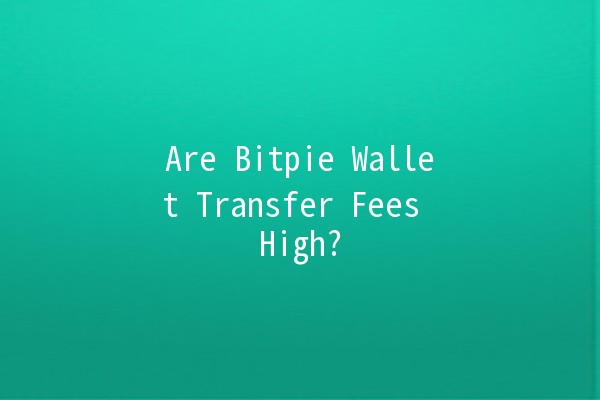




In the digital age, cryptocurrencies have captured the interest of countless users around the globe, and wallets are integral to managing these assets. One such wallet that has gained popularity is the Bitpie Wallet. A common question new users often ask is whether the transfer fees associated with Bitpie Wallet are high. In this article, we'll delve into the intricacies of Bitpie Wallet transfer fees, how they compare to other wallets, and provide practical tips to maximize your experience with this platform.
Before discussing transfer fees, it’s crucial to understand what Bitpie Wallet offers. Bitpie Wallet is a multichain wallet that allows users to manage various cryptocurrencies efficiently. Its features are designed for both novice and experienced crypto users, ensuring that everyone can navigate the digital currency landscape with ease.
MultiChain Support: Bitpie supports transactions across multiple blockchain networks, which is a significant advantage for users dealing with different cryptocurrencies.
UserFriendly Interface: The wallet's designed interface allows for easy navigation and usability, making it accessible even for newcomers.
Security Features: Bitpie Wallet emphasizes security through private key management, password protection, and biometric access options.
Integration with DApps: Bitspie also supports decentralized applications (DApps), enabling users to engage more deeply with the cryptocurrency ecosystem.

These features make Bitpie Wallet a valuable tool for any crypto enthusiast, but understanding the associated costs is just as essential.
Transfer fees in any cryptocurrency wallet, including Bitpie, can vary based on several factors:
When considering using Bitpie Wallet, it's useful to compare its transfer fees with those of other popular wallets:
Exodus Wallet: Exodus charges based on the network fee, which fluctuates based on market conditions. Typically these fees range from 0.001 to 0.01 BTC.
Coinbase Wallet: Users often report higher fees, especially for quick transfers, which can range between 3% and 4% of the transaction amount.
MetaMask: Fees can be unpredictably high during busy periods but average around $0.50 to $5.00 per transaction.
Trust Wallet: Similar to Bitpie, Trust Wallet has fees depending on blockchain congestion but often is more costeffective.
Overall, Bitpie Wallet's fees tend to be competitive with many wallets, especially during standard network conditions.
Example: If you notice that Ethereum network fees are unusually high during weekends, wait until weekday morning hours when traffic often decreases.
Example: Instead of sending several small amounts to various addresses, consider sending one lump sum to a single address and making the internal transfers later.
Example: Set a lower fee and schedule your transaction during offpeak hours.
Example: Websites like EthGasStation provide information on estimated gas fees for Ethereum transactions.
Example: Follow cryptocurrency news outlets to stay updated on any market news that might cause sudden price fluctuations and impact transaction costs.
Transfer fees are a critical aspect of cryptocurrency transactions, impacting the total cost of sending funds. Since these fees can vary based on conditions, knowing what to expect helps users manage their assets more efficiently.
Yes, different cryptocurrencies often have varying fee structures. For example, Bitcoin transactions can have comparatively higher fees than ERC20 token transfers on the Ethereum network.
While it may not be possible to avoid fees altogether, minimizing them is achievable through strategies like batching transactions or selecting lower fee options.
Bitpie Wallet typically provides transaction details, including fees imposed. Check your transaction history within the wallet app for a breakdown of costs.
Receiving cryptocurrency usually does not incur a fee. Most wallets only charge fees when sending or exchanging assets.
If your fees seem excessive, consider checking network congestion and if your transaction could be delayed or adjusted to a more suitable fee.
While it's essential to consider transaction fees when using a cryptocurrency wallet, Bitpie Wallet remains a viable option without excessively high costs. By effectively managing your transactions and being aware of fee structures, you can optimize your use of Bitpie Wallet while minimizing expenses. Whether you are sending small amounts or significant transfers, being strategic about transaction timing and fee settings will enhance your overall experience. Happy transacting!